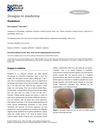 November 2023 in “Klìtinna ta organna transplantologìâ”
November 2023 in “Klìtinna ta organna transplantologìâ” MSC-derived exosomes can help treat COVID-19, hair loss, skin aging, and arthritis.
 December 2022 in “Exploratory animal and medical research”
December 2022 in “Exploratory animal and medical research” The study concluded that Acral lick dermatitis is most common in young male Labrador retrievers, often caused by psychological factors, and leads to skin inflammation and stress-related blood changes.
 November 2021 in “International Journal for Research in Applied Science and Engineering Technology”
November 2021 in “International Journal for Research in Applied Science and Engineering Technology” Lyophilized platelet-rich plasma is beneficial and effective for various medical treatments, including tissue regeneration and hair regrowth.
 July 2021 in “British Journal of Dermatology”
July 2021 in “British Journal of Dermatology” A woman with systemic sclerosis developed a unique scarring hair loss combining features of systemic sclerosis and frontal fibrosing alopecia.
 April 2019 in “Journal of Investigative Dermatology”
April 2019 in “Journal of Investigative Dermatology” Activating the Sonic hedgehog pathway can help regenerate hair follicles during wound healing in mice, potentially improving regeneration after injury.
 April 2019 in “Journal of Investigative Dermatology”
April 2019 in “Journal of Investigative Dermatology” Combining platelet-rich plasma injections and gel may effectively treat morphea, improving skin elasticity and reducing pain.
 April 2019 in “Journal of Investigative Dermatology”
April 2019 in “Journal of Investigative Dermatology” Wnt-signaling is regulated differently in skin cells and immune responses during wound healing.
 February 2019 in “International journal of research in dermatology”
February 2019 in “International journal of research in dermatology” The combined treatments were highly effective for improving atrophic acne scars.

Dermoscopy is useful for diagnosing hair loss patterns in dogs.
 October 2013 in “Journal of Investigative Dermatology”
October 2013 in “Journal of Investigative Dermatology” Collagen VII helps skin heal and stay strong, sirolimus may lower skin cancer risk in kidney transplant patients, high-molecular-mass hyaluronan helps naked mole rats resist cancer, dermal γδ T cells aid in hair growth in rodents, and overexpression of IL-33 in mouse skin causes itchiness, offering a model for studying allergic inflammation treatments.
 January 2013 in “The Pan African medical journal”
January 2013 in “The Pan African medical journal” Monilethrix causes short, fragile hair with no specific treatment available.
 April 2008 in “Australasian journal of dermatology”
April 2008 in “Australasian journal of dermatology” The book gives a basic overview of mesotherapy and fat-dissolving injections but lacks detailed guidance and effectiveness comparisons for practitioners.
 September 2005 in “Journal of Investigative Dermatology”
September 2005 in “Journal of Investigative Dermatology” Ferulic acid helps stabilize vitamins C and E for better skin protection from the sun, certain compounds may promote hair growth, atopic dermatitis patients have lower skin defense molecules, older men are more likely to get a type of skin cancer, and a substance called relaxin may prevent age-related skin thickening.
 408 citations,
January 2017 in “Science”
408 citations,
January 2017 in “Science” Some wound-healing cells can turn into fat cells around new hair growth in mice.
 350 citations,
June 1989 in “The American Journal of Medicine”
350 citations,
June 1989 in “The American Journal of Medicine” Itraconazole is potentially effective for treating invasive aspergillosis, but more research is needed.
 309 citations,
May 1993 in “Journal of The American Academy of Dermatology”
309 citations,
May 1993 in “Journal of The American Academy of Dermatology” Horizontal scalp biopsy sections effectively diagnose and predict MPAA, with follicular density and inflammation impacting hair regrowth.
 243 citations,
September 2016 in “Dermatology and Therapy”
243 citations,
September 2016 in “Dermatology and Therapy” Dermoscopy is a useful tool for identifying features of skin conditions, but more research is needed to define its role in dermatology.
 208 citations,
January 2013 in “Lab on a Chip”
208 citations,
January 2013 in “Lab on a Chip” The Multi-Organ-Chip improves the growth and quality of skin and hair in the lab, potentially replacing animal testing.
 205 citations,
April 2005 in “Journal of Investigative Dermatology”
205 citations,
April 2005 in “Journal of Investigative Dermatology” Scientists have found a way to create hair follicles from skin cells of newborn mice, which can grow and cycle naturally when injected into adult mouse skin.
 170 citations,
September 2019 in “Evidence-based Complementary and Alternative Medicine”
170 citations,
September 2019 in “Evidence-based Complementary and Alternative Medicine” Some medicinal plants can help heal wounds and may lead to new treatments.
 164 citations,
April 2008 in “Cochrane library”
164 citations,
April 2008 in “Cochrane library” Current treatments for alopecia show no significant long-term benefits.
 152 citations,
April 2012 in “Recent Patents on Inflammation & Allergy Drug Discovery”
152 citations,
April 2012 in “Recent Patents on Inflammation & Allergy Drug Discovery” Minoxidil treats hair loss, promotes growth, has side effects, and has recent patents.
 130 citations,
January 2017 in “International journal of nanomedicine”
130 citations,
January 2017 in “International journal of nanomedicine” Silver nanoparticles coated with substances like PEG showed strong antibacterial effects and improved wound healing when used in hydrogels.
 122 citations,
April 1995 in “Journal of Cutaneous Pathology”
122 citations,
April 1995 in “Journal of Cutaneous Pathology” The document describes how to tell different types of non-scarring hair loss apart by looking at hair and scalp tissue under a microscope.
 112 citations,
July 1998 in “Journal of Investigative Dermatology”
112 citations,
July 1998 in “Journal of Investigative Dermatology” Ruby laser pulses best destroy hair follicles during the growth phase and effectiveness varies with laser intensity; melanin is key for targeting, and timing treatments can improve results.
 97 citations,
May 2008 in “Journal of Cutaneous Pathology”
97 citations,
May 2008 in “Journal of Cutaneous Pathology” Different soft tissue fillers can cause various skin reactions; biodegradable fillers are safer and non-biodegradable ones like silicone can lead to long-term problems.
 94 citations,
August 1975 in “Journal of Cutaneous Pathology”
94 citations,
August 1975 in “Journal of Cutaneous Pathology” Male pattern baldness involves smaller hair follicles, larger oil glands, and other tissue changes, but not major blood supply issues.
 87 citations,
January 2016 in “Development”
87 citations,
January 2016 in “Development” Blocking β-catenin in skin cells improves hair growth during wound healing.
 83 citations,
January 2001 in “American journal of clinical dermatology”
83 citations,
January 2001 in “American journal of clinical dermatology” Clomipramine may significantly reduce hair-pulling in Trichotillomania, but more research is needed on treatments and early onset cases.
 77 citations,
July 2007 in “Dermatologic Therapy”
77 citations,
July 2007 in “Dermatologic Therapy” Methotrexate is a key, cost-effective drug for skin conditions, but requires careful monitoring for side effects.






























